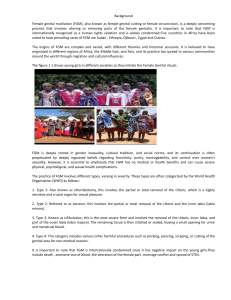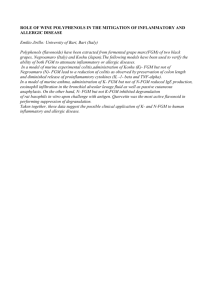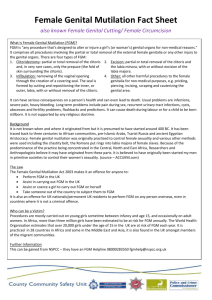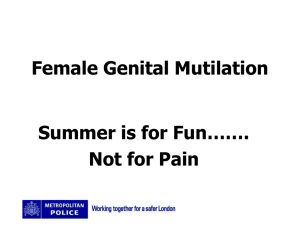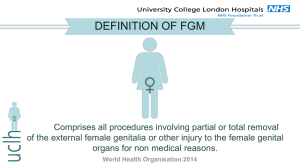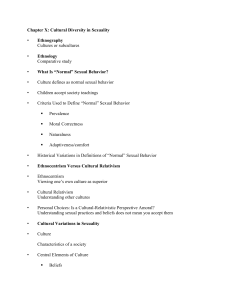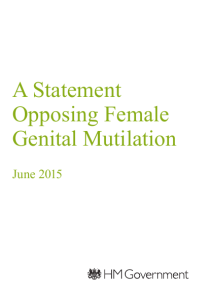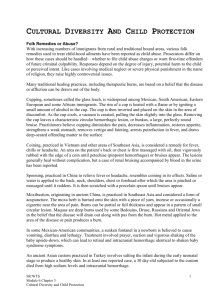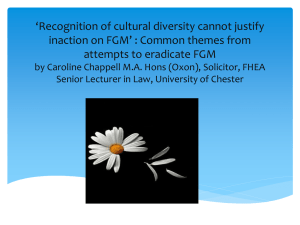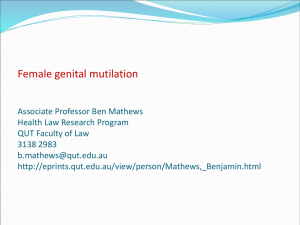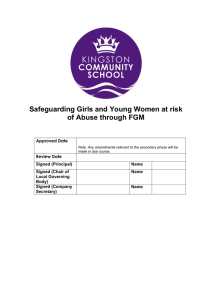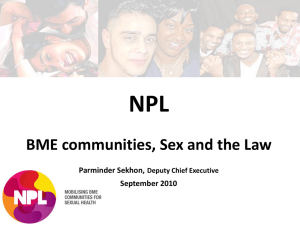Part D - Multicultural Issues
advertisement
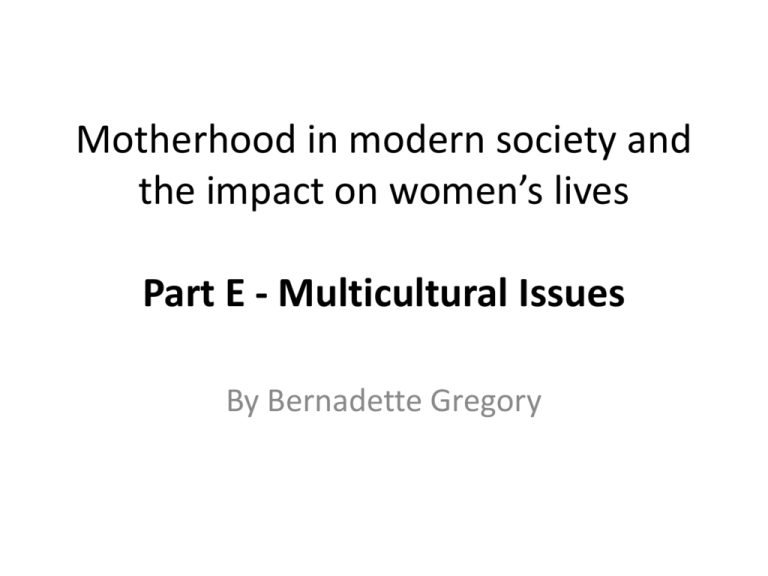
Motherhood in modern society and the impact on women’s lives Part E - Multicultural Issues By Bernadette Gregory What are the additional multi cultural issues ? • • • • • • Poverty Geographical location Housing type Area of deprivation People like pets, loud music Tattoos and ‘hoodies’ Equality issues • • • • • • • • Universal or selective care e.g. screening Equal access to information and services Translation and interpreter services Informed choice and informed consent Limited resources Public accountability Social exclusion Access to the cultural group Additional needs of ethnic minority groups • May be disadvantaged e.g. poverty, geography, area, housing, educational attainment • Social isolation • Unsure how the system works: seek help, referral • May have complex health needs • Not an homogenous group- adds to the complexities • Access to treatment and benefit entitlements • Different health beliefs and cultural practices • Different spiritual beliefs and practices Can you think of examples from clinical practice ? Examples of additional needs of ethnic minority groups • • • • • • • English not their first language Restricted access to benefits Cultural needs Unfamiliarity with maternity services in UK Female genital mutilation Arranged marriage Newly arrived in UK What are some of the health issues ? • Psychological – depression, anxiety, panic attacks, fear, PTS • Mental health issues • Physical – TB, HIV, parasitic disease, anaemia & other nutritional deficiencies, genetics • Hypertension, stroke, type II diabetes • Incomplete “booking” history or not referred for tests, follow up appointments so incomplete data eg immunisation follow up • Female genital mutilation (FGM) • Recreational drugs • Complementary/alternative medicine use • Multi agency approach to care Additional needs of asylum seekers and refugees • Language barriers- translation/interpretation • Unsure of how the system works – book late or not at all, miss appointments, miss tests • May have complex health needs but not an homogenous group • Entitled to free medical treatment and benefits • Additional physical or mental health issues because of traumatic experiences and/or isolation and migration • Different health beliefs and practices • Different spiritual beliefs and practices • Racism (Patel and Kelly, 2006) Cultural ethnocentrism Where the indigenous or majority cultural norms are seen as superior to others • Can you think of some examples ? One example could be the prevalence of Female Genital Mutilation (FGM) • Actual numbers are unknown • It is still practised in many countries and within certain countries it is estimated that between 50 – 98 % of women may be affected. • Due to migration, War and famine it is increasingly likely that UK midwives will care for a woman who has undergone these procedures • Over 86 000 first generation immigrant refugees /asylum seekers and girls who have undergone FGM live in the UK (Momoh , 2005:73). • This is likely to be an underestimation Why is it difficult to estimate numbers? • • • • • • • Census data unreliable and date easily Population surveys unreliable Migration Asylum seekers/refugee status Fear of disclosure Communication barriers Cultural differences Different countries/different practices More common Less common • • • • • • • • Uganda • Nigeria • Kenya Egypt Somalia Sudan Ethiopia Ghana Mali Burkina Faso W.H.O. (2012) What does the World say about FGM ? • There are many legislative texts that either directly condemn FGM or are used as a basis to question or reject the practice • The Universal Declaration of Human Rights (1948) • The Convention of the Rights of the Child (1989) • Resolution by the European Parliament (2001) • FGM is prohibited in most EU states and in some countries criminal prosecutions have been sought. Most have a basis in child protection or protection against personal violence • Many also have a provision for extra territorial protection • Many have legislation against individual health professionals • In UK see FORWARD www.forwarduk.org.uk Legislation in the UK The Prohibition of Female Circumcision Act 1985 made it illegal to “excise, infibulate or otherwise mutilate the whole or any part of the labia majora or minora or clitoris by another person or to aid, abet counsel or procure the performance by another person of any of those acts on that other person’s body” Fines of £1000 or a term of imprisonment not exceeding 6 months or both See www.legislation.gov.uk The Children Act (1989) • Specifically highlights FGM under section entitled “Child Protection in Specific Circumstances” • Local authorities may exercise their powers if they believe the child has been/or likely to be subject to FGM Female Genital Mutilation Act 2003 • Originated as a Private Members Bill enacted in March 2004 • This legislation was significant in that it introduced the concept of “extra- territoriality” - girls who are UK nationals or UK permanent residents cannot be removed from the UK for purposes of FGM and her parents and others can be prosecuted for aiding or abetting this procedure • This protection applies irrespective of the legislation in the country to which the girl was removed • This Law strengthens and reinforces the provisions of the 1985 Act • This Act only applies to England, Wales and Northern Ireland So a black feminist may think we have a long way to go yet to achieve equality Reflective piece: What would you do to improve NHS and maternity services to be more inclusive for Black and Minority ethnic groups (BME)? References Momoh, C. (2005) Female genital mutilation Oxon, Radcliffe Patel, B. and Kelly, N. (2006) ‘The social care needs of refuges and asylum seekers’ Social Care Institute. Bristol, Polity Press. World Health Organisation (2012) www.who.int/mediacentre/factsheets/fs241/e n/
